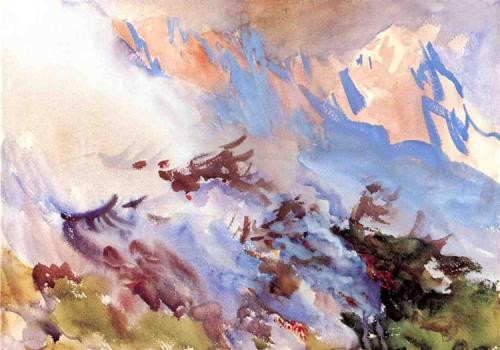The Story of Phaeton (VI) – Ovid
by richibi

“Mountain Fire“ (c.1903 – c.1908)
John Singer Sargent
_________
because Phaeton was light, nor cou’d
he fill the seat, the horses he would’ve
controlled forsake / Their stated course,
and leave the beaten track
What cou’d he do? his eyes, if backward cast,
Find a long path he had already past;
If forward, still a longer path they find:
Both he compares, and measures in his mind;
And sometimes casts an eye upon the east,
And sometimes looks on the forbidden west,
note the description of the movement
of the eyes, backward, forward, east
and west, uncontrolled, erratic, nearing
madness, despite attempts, however
futile, to remain rational, steady, his
very mind, comparing, measuring, is
quickly losing its bearings
forbidden, once again, this should
probably read forbidding
The horses’ names he knew not in the fright,
Nor wou’d he loose the reins, nor cou’d he hold ’em right.
“Now, Dasher! Now, Dancer! Now,
Prancer, and Vixen! / “On, Comet!
On, Cupid! On, Donner and Blitzen!,
who drove another of the very few
famous chariots in our Western
cultural history
couldn’t help it
the only other one I could think of
is that of the Four Horsemen of
the Apocalypse, red, white, black,
and pale horses, which I won’t get
into, but to say that they have no
names
the horses who drove the Chariot of
the Sun, meanwhile, were called
Phlegon, Aeos, Aethon, and Pyrios,
though I fully admit that I had to
look those up, then again I’ve never
had to ride the Chariot of the Sun
it appears that Helios / Phoebus /
Apollo had other steeds in his stable
as well, for a rainy day, but they don’t
feature in this particular story
Now all the horrors of the Heav’ns he spies,
And monstrous shadows of prodigious size,
That, deck’d with stars, lye scatter’d o’er the skies.
lye, lie
There is a place above, where Scorpio bent
In tail and arms surrounds a vast extent;
Scorpio, the constellation Scorpius,
visible only in the Southern hemisphere
Scorpio, represented by a scorpion,
thus has eight legs, or arms, and a
highly distinctive tail
In a wide circuit of the Heav’ns he shines,
And fills the space of two coelestial signs.
coelestial, celestial
Soon as the youth beheld him vex’d with heat
Brandish his sting, and in his poison sweat,
Half dead with sudden fear he dropt the reins;
vex’d with heat, from the wayward
chariot, Scorpio [b]randish[es]
his sting
poison sweat, Scorpio, under the
influence of the heat, sweat[s],
exudes, produces, characteristically,
poison
The horses felt ’em loose upon their mains,
mains, manes, long hair
And, flying out through all the plains above,
Ran uncontroul’d where-e’re their fury drove;
Rush’d on the stars, and through a pathless way
Of unknown regions hurry’d on the day.
hurry’d on the day, kept the day going
at its usual, however presently pathless,
or uncharted, pace
And now above, and now below they flew,
And near the Earth the burning chariot drew.
ever, and increasingly, ominously
The clouds disperse in fumes, the wond’ring Moon
Beholds her brother’s steeds beneath her own;
wond’ring, confused, puzzled
Brother Sun, Sister Moon
The highlands smoak, cleft by the piercing rays,
Or, clad with woods, in their own fewel blaze.
smoak, smoke
fewel, fuel
where the highlands are clad with
woods, they blaze in the fires
consuming their own trees
Next o’er the plains, where ripen’d harvests grow,
The running conflagration spreads below.
But these are trivial ills: whole cities burn,
And peopled kingdoms into ashes turn.
an apocalypse
The mountains kindle as the car draws near,
the car, the chariot
Athos and Tmolus red with fires appear;
Athos, Mount Athos, Tmolus, Mount
Tmolus, both mountains in Greece,
both named after mountain gods
Oeagrian Haemus (then a single name)
Haemus Mons, an early name for
the Balkan Mountains
Oeagria, Agria, a town in Greece
And virgin Helicon increase the flame;
Helicon, Mount Helicon, notable for
being the home of the Muses
Taurus and Oete glare amid the sky,
Taurus, the Taurus Mountains, a
mountain range in southern Turkey
Oete, Mount Oeta, a mountain in
Central Greece
And Ida, spight of all her fountains, dry.
Eryx and Othrys, and Cithaeron, glow,
And Rhodope, no longer cloath’d in snow;
High Pindus, Mimas, and Parnassus, sweat,
And Aetna rages with redoubled heat.
spight, in spite
Ida, Eryx, Othrys, Cithaeron, Rhodope,
Pindus, and the more familiar Parnassus,
and Aetna, or Etna, are all mountains, or
ranges, in the Mediterranean, Mimas, an
island there, which is to say, a partially
submerged mountain, all of them
sweltering
see above
Ev’n Scythia, through her hoary regions warm’d,
Scythia, a region northeast of Ancient
Greece, barbarian to the more cultured
people of Greek Antiquity, coarse
forebears of the Cossacks
hoary, sullied white, tired, withered
In vain with all her native frost was arm’d.
even so frosty a region as Scythia
was not immune to, arm’d against,
the running conflagration
Cover’d with flames the tow’ring Appennine,
And Caucasus, and proud Olympus, shine;
And, where the long-extended Alpes aspire,
Now stands a huge continu’d range of fire.
the Appennine, Caucasus, Olympus,
and Alpes, or Alps, are all mountain
ranges throughout Europe, the
representative part then of the
known world
Th’ astonisht youth, where-e’er his eyes cou’d turn,
Beheld the universe around him burn:
The world was in a blaze; nor cou’d he bear
The sultry vapours and the scorching air,
Which from below, as from a furnace, flow’d;
And now the axle-tree beneath him glow’d:
Lost in the whirling clouds that round him broke,
And white with ashes, hov’ring in the smoke.
He flew where-e’er the horses drove, nor knew
Whither the horses drove, or where he flew.
R ! chard